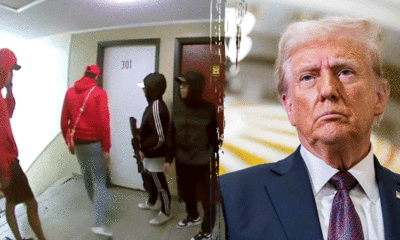Business
Yellen to Visit China in Bid to Steady Economic Ties

Treasury Secretary Janet L. Yellen will travel to China this week, a high-stakes visit that is intended to help stabilize the fraught relationship between the world’s two largest economies.
The trip to China will be Ms. Yellen’s first as Treasury secretary and follows Secretary of State Antony J. Blinken’s visit last month. It comes at a moment of tension between the United States and Beijing following the discovery of a Chinese spy balloon traversing America earlier this year and Chinese frustration with the Biden administration’s efforts to block China from accessing certain sensitive technologies.
Ms. Yellen’s visit, which will begin on Thursday, also coincides with a moment of heightened uncertainty for the global economy, with China’s post-pandemic output flagging and the United States trying to avoid a recession while containing inflation.
While both sides have talked about re-establishing dialogue, deep divisions persist and the meetings are likely to cover sensitive issues that have been festering for years.
The Biden administration has been taking steps to reduce America’s reliance on Chinese imports and has sought to limit China’s access to semiconductors, biotechnology and sensitive technology that powers things like robotics, artificial intelligence capabilities and high-end computing.
At the same time, China has frustrated the United States with its reluctance to renegotiate the terms of loans it is owed by poor countries facing default and has maintained close economic ties with Russia despite that country’s invasion of Ukraine.
A senior Treasury Department official, who spoke on the condition of anonymity about the priorities for the trip, said on Sunday that Ms. Yellen would meet with top Chinese officials and American companies doing business in China. The official said that Ms. Yellen would talk to her Chinese counterparts about global challenges and mutual areas of concern.
The Treasury secretary is expected to raise objections to China’s recent ban aimed at Micron Technology, the U.S.-based manufacturer of memory chips used in phones, computers and other electronics. The Chinese government in May barred companies that handle critical information from buying microchips made by Micron, after the Biden administration recently took steps to bar Chinese chip makers from gaining access to crucial tools needed to make advanced chips. The company’s chips, which are used for memory storage in all kinds of electronics, like phones and computers, were deemed to pose “relatively serious cybersecurity problems” by China’s internet watchdog after a review.
Ms. Yellen is also expected to express concerns about human rights violations related to China’s treatment of ethnic minorities in Xinjiang, where the Chinese government has been accused of mass detention of Muslims. American officials are also hoping to gain a better understanding of the scope of China’s new counterespionage law, which could present new challenges for foreign companies.
While grievances are likely to be aired by both sides, Ms. Yellen intends to make the case that U.S. actions to become less reliant on China and protect its national security are not intended to “decouple” the two economies, which are highly intertwined.
Ms. Yellen has sounded a softer tone toward China in recent weeks, describing the relationship between Washington and Beijing as important for the entire world. In an interview with MSNBC last week, she suggested that “healthy competition” could benefit workers and businesses in both countries.
“My hope in traveling to China is to re-establish contact,” Ms. Yellen said. “There are a new group of leaders, we need to get to know one another.”
She added that the two nations “need to discuss our disagreements with one another so that we don’t have misunderstandings, don’t misunderstand one another’s intentions.”
The Treasury secretary is likely to field pointed questions from her counterparts about the Biden administration’s intentions amid concerns in China that America’s actions do not match its words.
The administration has imposed sweeping restrictions on China’s access to advanced technology, saying that Beijing’s ability to use such technology poses a national security threat to the United States.
In remarks last Wednesday at the Council on Foreign Relations in New York, Mr. Blinken said it was in America’s interest to keep Beijing from gaining access to technology that could be used to harm the United States.
“How is it in our interest to allow them to get technology that they may turn around and use against us?” he asked, citing China’s expanding nuclear weapons program, its development of hypersonic missiles and its use of artificial intelligence “potentially for repressive purposes.”
“If they were in our shoes, they would do exactly the same thing,” he said, adding that the U.S. was imposing “very targeted, very narrowly defined controls.”
The White House has also been preparing new investment restrictions aimed at curtailing American dollars used to finance the development of advanced technologies within Chinese borders.
And while Ms. Yellen has in the past questioned the efficacy of tariffs on Chinese imports, the levies imposed by the Trump administration remain in place and seem unlikely to be rolled back anytime soon.
China has also expressed frustration with America’s efforts to reorient its supply chain away from China and toward other countries the United States considers allies — a trend Ms. Yellen and other cabinet officials have called “friendshoring.”
For its part, the United States continues to be frustrated by China’s reluctance to allow poor countries that are facing default to restructure the terms of their loans, and has concerns about China’s weakening currency, which makes its exports more competitive in the United States.
In addition to the currency tensions, China is struggling with debt troubles at home and abroad. The debt crisis in developing countries is coming at a bad time for China. As a slow-motion housing crisis unfolds, many banks already face the potential for heavy losses on their loans to real estate developers and to the financing units of local governments. That leaves them leery of accepting heavy losses on overseas loans, even as Western experts predict that developing countries may not be able to recover without significant debt relief.
American officials had very limited contact with Chinese officials through the pandemic, when China almost completely closed its borders and stopped sending its officials to international economic gatherings. China has also gradually halted the release of thousands of economic data series over the last several years as part of a national security campaign, and that has made it even harder for American officials to understand what is happening in the Chinese economy.
In a sign of how seriously Beijing is taking Ms. Yellen’s visit, China on Saturday named a new Communist Party secretary to lead the country’s central bank: Pan Gongsheng, a prominent technocrat who has overseen China’s currency policy since 2016 as director of the State Administration of Foreign Exchange.
Ms. Yellen and her team “will likely try to get more insights into the Chinese economy as it gets more opaque,” said Christopher Adams, a former senior coordinator for China affairs at the Treasury Department.

Business
Albania Gives Jared Kushner Hotel Project a Nod as Trump Returns

The government of Albania has given preliminary approval to a plan proposed by Jared Kushner, Donald J. Trump’s son-in-law, to build a $1.4 billion luxury hotel complex on a small abandoned military base off the coast of Albania.
The project is one of several involving Mr. Trump and his extended family that directly involve foreign government entities that will be moving ahead even while Mr. Trump will be in charge of foreign policy related to these same nations.
The approval by Albania’s Strategic Investment Committee — which is led by Prime Minister Edi Rama — gives Mr. Kushner and his business partners the right to move ahead with accelerated negotiations to build the luxury resort on a 111-acre section of the 2.2-square-mile island of Sazan that will be connected by ferry to the mainland.
Mr. Kushner and the Albanian government did not respond Wednesday to requests for comment. But when previously asked about this project, both have said that the evaluation is not being influenced by Mr. Kushner’s ties to Mr. Trump or any effort to try to seek favors from the U.S. government.
“The fact that such a renowned American entrepreneur shows his interest on investing in Albania makes us very proud and happy,” a spokesman for Mr. Rama said last year in a statement to The New York Times when asked about the projects.
Mr. Kushner’s Affinity Partners, a private equity company backed with about $4.6 billion in money mostly from Saudi Arabia and other Middle East sovereign wealth funds, is pursuing the Albania project along with Asher Abehsera, a real-estate executive that Mr. Kushner has previously teamed up with to build projects in Brooklyn, N.Y.
The Albanian government, according to an official document recently posted online, will now work with their American partners to clear the proposed hotel site of any potential buried munitions and to examine any other environmental or legal concerns that need to be resolved before the project can move ahead.
The document, dated Dec. 30, notes that the government “has the right to revoke the decision,” depending on the final project negotiations.
Mr. Kushner’s firm has said the plan is to build a five-star “eco-resort community” on the island by turning a “former military base into a vibrant international destination for hospitality and wellness.”
Ivanka Trump, Mr. Trump’s daughter, has said she is helping with the project as well. “We will execute on it,” she said about the project, during a podcast last year.
This project is just one of two major real-estate deals that Mr. Kushner is pursuing along with Mr. Abehsera that involve foreign governments.
Separately, the partnership received preliminary approval last year to build a luxury hotel complex in Belgrade, Serbia, in the former ministry of defense building, which has sat empty for decades after it was bombed by NATO in 1999 during a war there.
Serbia and Albania have foreign policy matters pending with the United States, as both countries seek continued U.S. support for their long-stalled efforts to join the European Union, and officials in Washington are trying to convince Serbia to tighten ties with the United States, instead of Russia.
Virginia Canter, who served as White House ethics lawyer during the Obama and Clinton administrations and also an ethics adviser to the International Monetary Fund, said even if there was no attempt to gain influence with Mr. Trump, any government deal involving his family creates that impression.
“It all looks like favoritism, like they are providing access to Kushner because they want to be on the good side of Trump,” Ms. Canter said, now with State Democracy Defenders Fund, a group that tracks federal government corruption and ethics issues.
Business
Craft supplies retailer Joann declares bankruptcy for the second time in a year

The craft supplies and fabric retailer Joann filed for bankruptcy for the second time in less than a year, as the chain wrestles with declining sales and inventory shortages, the company said Wednesday.
The retailer emerged from a previous Chapter 11 bankruptcy process last April after eliminating $505 million in debt. Now, with $615 million in liabilities, the company will begin a court-supervised sale of its assets to repay creditors. The company owes an additional $133 million to its suppliers.
“We hope that this process enables us to find a path that would allow Joann to continue operating,” said interim Chief Executive Michael Prendergast in a statement. “The last several years have presented significant and lasting challenges in the retail environment, which, coupled with our current financial position and constrained inventory levels, forced us to take this step.”
Joann’s more than 800 stores and websites will remain open throughout the bankruptcy process, the company said, and employees will continue to receive pay and benefits. The Hudson, Ohio-based company was founded in 1943 and has stores in 49 states, including several in Southern California.
According to court documents, Joann began receiving unpredictable and inconsistent deliveries of yarn and sewing items from its suppliers, making it difficult to keep its shelves stocked. Joann’s suppliers also discontinued certain items the retailer relied on.
Along with the “unanticipated inventory challenges,” Joann and other retailers face pressure from inflation-wary consumers and interest rates that were for a time the highest in decades. The crafts supplier has also been hindered by competition from others in the space, including Michael’s, Etsy and Hobby Lobby, said Retail Wire Chief Executive Dominick Miserandino.
“It did not necessarily learn to evolve like its nearby competitors,” Miserandino said of Joann. “Not many people have heard of Joann in the way they’ve heard of Michael’s.”
Joann is not the first retailer to continue to struggle after going through bankruptcy. The party supply chain Party City announced last month it would be shutting down operations, after filing for and emerging from Chapter 11 bankruptcy in 2023.
Over the last two years, more than 60 companies have filed for bankruptcy for a second or third time, Bloomberg reported, based on information from BankruptcyData. That’s the most over a comparable period since 2020, when the COVID-19 pandemic kept shoppers home.
Discount chain Big Lots filed for bankruptcy last September, and the Container Store, a retailer offering storage and organization products, declared bankruptcy last month. Companies that rely heavily on brick-and-mortar locations are scrambling to keep up with online retailers and big-box chains. Fast-casual restaurants such as Red Lobster and Rubio’s Coastal Grill have also struggled.
High prices have prompted consumers to pull back on discretionary spending, while rising operating and labor costs put additional pressure on businesses, experts said. The U.S. annual inflation rate for 2024 was 2.9%, down from 3.4% in 2023. But inflation has been on the rise since September and remains above the Federal Reserve’s goal of 2%.
If a sale process for Joann is approved, Gordon Brothers Retail Partners would serve as the stalking-horse bidder and set the floor for the auction.
Business
U.S. Sues Southwest Airlines Over Chronic Delays

The federal government sued Southwest Airlines on Wednesday, accusing the airline of harming passengers who flew on two routes that were plagued by consistent delays in 2022.
In a lawsuit, the Transportation Department said it was seeking more than $2.1 million in civil penalties over the flights between airports in Chicago and Oakland, Calif., as well as Baltimore and Cleveland, that were chronically delayed over five months that year.
“Airlines have a legal obligation to ensure that their flight schedules provide travelers with realistic departure and arrival times,” the transportation secretary, Pete Buttigieg, said in a statement. “Today’s action sends a message to all airlines that the department is prepared to go to court in order to enforce passenger protections.”
Carriers are barred from operating unrealistic flight schedules, which the Transportation Department considers an unfair, deceptive and anticompetitive practice. A “chronically delayed” flight is defined as one that operates at least 10 times a month and is late by at least 30 minutes more than half the time.
In a statement, Southwest said it was “disappointed” that the department chose to sue over the flights that took place more than two years ago. The airline said it had operated 20 million flights since the Transportation Department enacted its policy against chronically delayed flights more than a decade ago, with no other violations.
“Any claim that these two flights represent an unrealistic schedule is simply not credible when compared with our performance over the past 15 years,” Southwest said.
Last year, Southwest canceled fewer than 1 percent of its flights, but more than 22 percent arrived at least 15 minutes later than scheduled, according to Cirium, an aviation data provider. Delta Air Lines, United Airlines, Alaska Airlines and American Airlines all had fewer such delays.
The lawsuit was filed in the United States District Court for the Northern District of California. In it, the government said that a Southwest flight from Chicago to Oakland arrived late 19 out of 25 trips in April 2022, with delays averaging more than an hour. The consistent delays continued through August of that year, averaging an hour or more. On another flight, between Baltimore and Cleveland, average delay times reached as high as 96 minutes per month during the same period. In a statement, the department said that Southwest, rather than poor weather or air traffic control, was responsible for more than 90 percent of the delays.
“Holding out these chronically delayed flights disregarded consumers’ need to have reliable information about the real arrival time of a flight and harmed thousands of passengers traveling on these Southwest flights by causing disruptions to travel plans or other plans,” the department said in the lawsuit.
The government said Southwest had violated federal rules 58 times in August 2022 after four months of consistent delays. Each violation faces a civil penalty of up to $37,377, or more than $2.1 million in total, according to the lawsuit.
The Transportation Department on Wednesday also said that it had penalized Frontier Airlines for chronically delayed flights, fining the airline $650,000. Half that amount was paid to the Treasury and the rest is slated to be forgiven if the airline has no more chronically delayed flights over the next three years.
This month, the department ordered JetBlue Airways to pay a $2 million fine for failing to address similarly delayed flights over a span of more than a year ending in November 2023, with half the money going to passengers affected by the delays.
-
/cdn.vox-cdn.com/uploads/chorus_asset/file/25822586/STK169_ZUCKERBERG_MAGA_STKS491_CVIRGINIA_A.jpg)
/cdn.vox-cdn.com/uploads/chorus_asset/file/25822586/STK169_ZUCKERBERG_MAGA_STKS491_CVIRGINIA_A.jpg) Technology7 days ago
Technology7 days agoMeta is highlighting a splintering global approach to online speech
-

 Science5 days ago
Science5 days agoMetro will offer free rides in L.A. through Sunday due to fires
-
/cdn.vox-cdn.com/uploads/chorus_asset/file/25821992/videoframe_720397.png)
/cdn.vox-cdn.com/uploads/chorus_asset/file/25821992/videoframe_720397.png) Technology1 week ago
Technology1 week agoLas Vegas police release ChatGPT logs from the suspect in the Cybertruck explosion
-

 Movie Reviews1 week ago
Movie Reviews1 week ago‘How to Make Millions Before Grandma Dies’ Review: Thai Oscar Entry Is a Disarmingly Sentimental Tear-Jerker
-

 Health1 week ago
Health1 week agoMichael J. Fox honored with Presidential Medal of Freedom for Parkinson’s research efforts
-

 Movie Reviews1 week ago
Movie Reviews1 week agoMovie Review: Millennials try to buy-in or opt-out of the “American Meltdown”
-

 News1 week ago
News1 week agoPhotos: Pacific Palisades Wildfire Engulfs Homes in an L.A. Neighborhood
-

 World1 week ago
World1 week agoTrial Starts for Nicolas Sarkozy in Libya Election Case



















